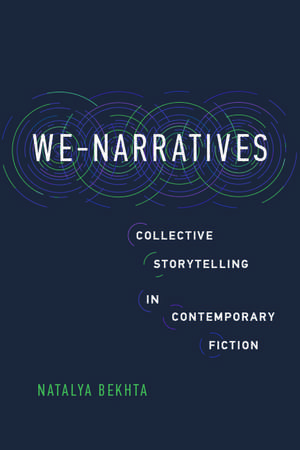We-Narratives: Collective Storytelling in Contemporary Fiction: Theory and Interpretation of Narrative
Autor Natalya Bekhtaen Limba Engleză Hardback – iul 2020
Winner, 2021 Perkins Prize from the International Society for the Study of Narrative Natalya Bekhta’s We-Narratives: Collective Storytelling in Contemporary Fiction analyzes a storytelling form shaped by the pronoun “we,” probing the tensions between individuality and collectivity in more recent narratives in English. Despite a growing interest in collective characters and the we-form in narratology and beyond, narrative theory has not yet done justice to the plural voice in fiction. In fact, the formulation of a poetics of collective expression needs clear theoretical conventions and a reassessment of established concepts in order to approach plural voices and agents on their own terms. We-Narratives addresses this demand by distinguishing between indicative and performative uses of the first-person plural pronoun in fiction and by identifying formal and rhetorical possibilities of stories told by group narrators. What does it mean for a multitude to speak as one? How can a truly collective narrative voice be achieved or lost? What are its aesthetic and political repercussions? In order to tackle these questions, Bekhta reads a range of contemporary novels and short stories by Jeffrey Eugenides, Joshua Ferris, Toby Litt, Zakes Mda, Joyce Carol Oates, and Julie Otsuka. She also focuses on narrative innovation by Margaret Atwood, William Faulkner, and Susan Sontag. These narratives feature group protagonists and narrators and therefore offer insight into collective narrative discourse and focalization, construction of communal knowledge and unreliability. We-narrative, taken as a distinct storytelling form, illuminates fiction’s expressive potential and nuances models of narrative analysis.
Din seria Theory and Interpretation of Narrative
-
 Preț: 314.03 lei
Preț: 314.03 lei -
 Preț: 271.17 lei
Preț: 271.17 lei -
 Preț: 346.23 lei
Preț: 346.23 lei -
 Preț: 305.25 lei
Preț: 305.25 lei -
 Preț: 280.83 lei
Preț: 280.83 lei -
 Preț: 273.46 lei
Preț: 273.46 lei - 23%
 Preț: 476.07 lei
Preț: 476.07 lei -
 Preț: 264.26 lei
Preț: 264.26 lei - 19%
 Preț: 588.30 lei
Preț: 588.30 lei - 23%
 Preț: 581.06 lei
Preț: 581.06 lei -
 Preț: 258.88 lei
Preț: 258.88 lei - 23%
 Preț: 479.49 lei
Preț: 479.49 lei - 23%
 Preț: 444.72 lei
Preț: 444.72 lei - 23%
 Preț: 470.28 lei
Preț: 470.28 lei - 23%
 Preț: 471.20 lei
Preț: 471.20 lei -
 Preț: 314.03 lei
Preț: 314.03 lei -
 Preț: 274.83 lei
Preț: 274.83 lei - 23%
 Preț: 473.13 lei
Preț: 473.13 lei -
 Preț: 517.90 lei
Preț: 517.90 lei
Preț: 473.13 lei
Preț vechi: 614.45 lei
-23% Nou
Puncte Express: 710
Preț estimativ în valută:
90.53€ • 94.72$ • 75.21£
90.53€ • 94.72$ • 75.21£
Carte tipărită la comandă
Livrare economică 02-16 aprilie
Preluare comenzi: 021 569.72.76
Specificații
ISBN-13: 9780814214411
ISBN-10: 081421441X
Pagini: 218
Ilustrații: 5 b&w illustrations
Dimensiuni: 152 x 229 x 20 mm
Greutate: 0.45 kg
Ediția:1
Editura: Ohio State University Press
Colecția Ohio State University Press
Seria Theory and Interpretation of Narrative
ISBN-10: 081421441X
Pagini: 218
Ilustrații: 5 b&w illustrations
Dimensiuni: 152 x 229 x 20 mm
Greutate: 0.45 kg
Ediția:1
Editura: Ohio State University Press
Colecția Ohio State University Press
Seria Theory and Interpretation of Narrative
Recenzii
“There's something deeply intuitive and appealing about reading Bekhta’s work in our contemporary moment—a moment filled with both devastating collective crises and energizing collective mobilizations…Bekhta’s monograph begins to address the need for a more sophisticated vocabulary and appreciation for this we-mode thinking and acting, for how we tell stories, together…Readers of We-Narratives have a ‘close-reading, probability-obsessed narrative theorist’ like Bekhta to thank for a sophisticated theoretical toolkit we can use to begin to do so.” —Shannon Lambert, Diegesis
“Combining theoretical sophistication, interpretive acumen, and a broad range of narratological insights, Natalya Bekhta’s We-Narratives delivers a compelling account of narratives cast in the we-form.” —Marco Caracciolo
“Combining theoretical sophistication, interpretive acumen, and a broad range of narratological insights, Natalya Bekhta’s We-Narratives delivers a compelling account of narratives cast in the we-form.” —Marco Caracciolo
Notă biografică
Natalya Bekhta is a postdoctoral research fellow at the Helsinki Collegium for Advanced Studies.
Cuprins
Contents Acknowledgments Introduction Telling a Story in the Plural Chapter 1 We-Narrative: The First-Person Plural Narrative Situation Chapter 2 We-Discourses: The We-Pronoun and Its Indicative and Performative Uses in Fiction Chapter 3 Plural Narrators: Collective Voices, Lyric Progression, and Direct Speech by Groups Chapter 4 Plural Perspective: Group Ethos, Narrators-Voyeurs, and Diegetic Levels Chapter 5 Collective Knowledge: Epistemological Possibilities of We-Narrators, Gossip, and Unreliability Chapter 6 Us versus Them: Community Dynamics in We-Narratives Conclusion Works Cited Index
Descriere
Provides a comprehensive account of the structural and linguistic distinctiveness of stories told in the first-person plural, describing its features and rhetorical effects.
